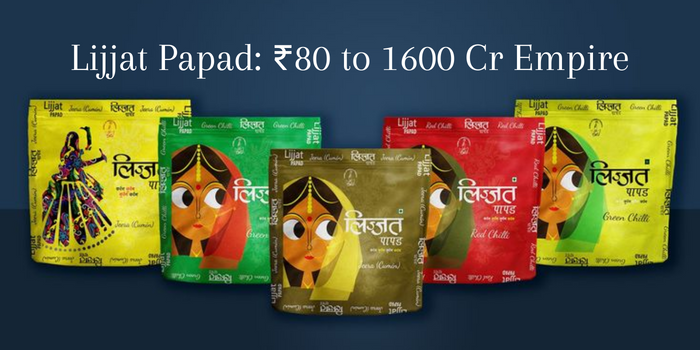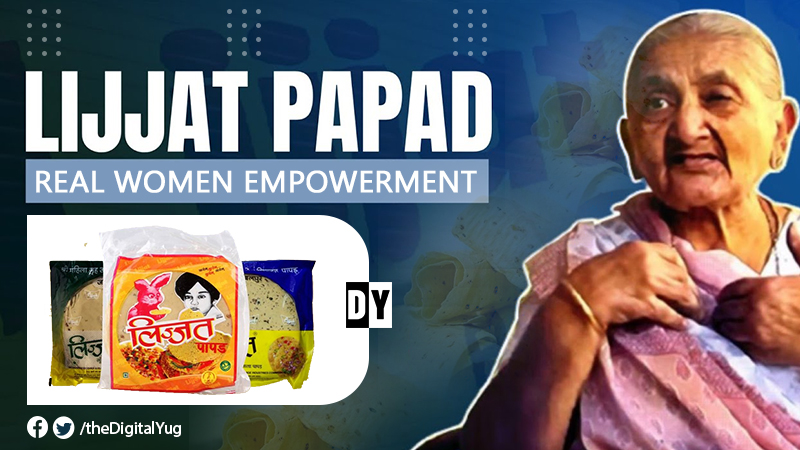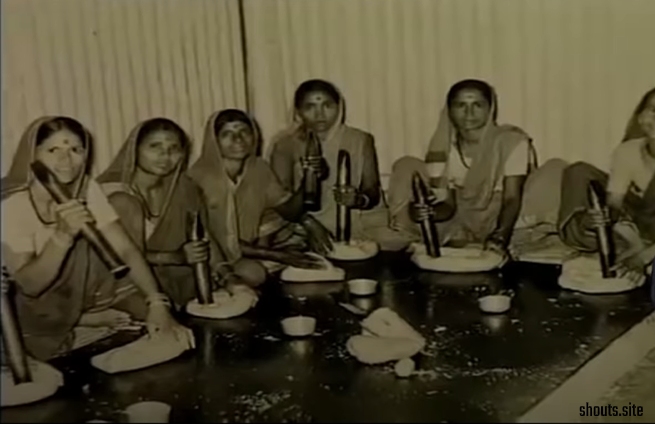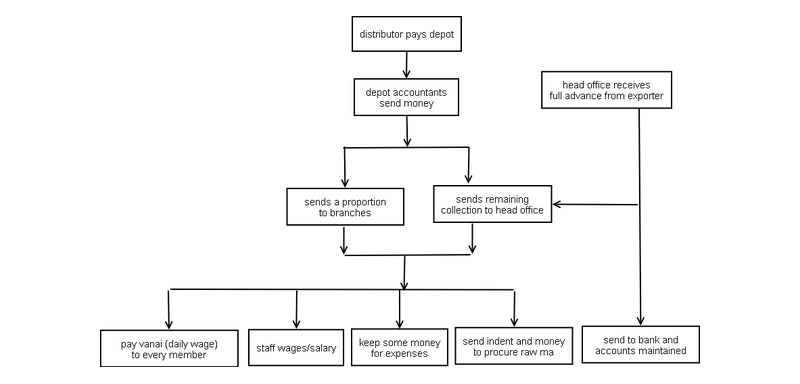₹80 to 1600 Cr Empire: Lijjat Papad Case Study

A cooperative movement aims to encourage individuals to produce, buy, and sell commodities together and share the profits without making anyone the sole owner of the franchise. It is an initiative to form a collective community, and Shri Mahila Griha Udyog Lijjat Papad did just that. The extraordinary story of Lijjat Papad— a venture founded by seven women of Mumbai, which is now worth multi-million dollars, is the epitome of female empowerment in a patriarchal society. This Lijjat Papad case study will explore how the cooperative grew from Rs 80 to Rs 800 crore.
The modest beginnings of Lijjat started in 1959 when seven housewives of Mumbai met on a rooftop one bright morning to make four packages of papads. The founders had resolved from the start that they would not ask anyone for money or assistance, even if the organization suffered loss and slowly increased its manpower, which only included women. The group gained considerable popularity only through word of mouth and could incur an annual sale of Rs 6196 in the first year. By the end of the third year, there were more than 300 Lijjat sisters, as they like to call themselves.
Currently, Lijjat Papad cooperation employs 45,000 women spread over India. The women are primarily housewives who are offered opportunities to use their cooking skills and become the ‘co-owners’ of the establishment from the comfort of their homes. Their wafer-thin snacks, called papads or papadums have become a symbol for the upliftment of women from disadvantaged backgrounds. Lijjat Papad has now taken its journey toward 82 branches in 17 states of India. Moreover, the women-led cooperative also has a strong base in 25 different nations of the world. They have an annual revenue of Rs. 1600 crores.
You can also check this out Sweetening the beauty industry- Vineeta Singh
Life of a Lijjat sister begins before dawn when they line up in the morning to drop off finished goods and pick up the freshly prepared lentil dough through which the papads are made. They stretch out and roll the dough, which is speckled with black pepper and cumin seeds, into small circular-shaped flats that are then allowed to dry. The job doesn’t require any formal education but only a handful of skills that make it possible for workers to gain financial independence. Every woman earns according to their production capacity and role in the organization, and men are only allowed for the roles of assistants or drivers.
Due to the cooperative’s stringent sourcing policies, they are now able to expand their business to other products such as masalas, chilis, detergent, and soap. Lijjat’s enthusiasm, transparency, and profit-sharing model are the byproducts of the cooperative’s core vision to provide a common purpose to the women of the marginalized communities of India, where female workforce participation has been declining for years. From the very beginning, Lijjat Papad has made sure to follow a business-oriented perspective that not only earns their women financial security but also a way through which they can gain control over their lives.

Leave a Comment Cancel Reply
Your email address will not be published. Required fields are marked *
Save my name, email, and website in this browser for the next time I comment.
Related Posts

Sustainable Fashion Threads: A Revolution for Tomorrow

E-commerce Giants: Dominance in the Digital Marketplace

Get the best stories on the Newsletter

Lijjat Papad: A Success Story of Empowering Women and Building a Sustainable Business | Business Model & Case Study
Table of Contents
Introduction to Lijjat Papad and its history
Lijjat Papad is a well-known Indian brand of papad, which is a type of thin, crisp, and circular-shaped Indian bread. The company was established in 1959 by a group of seven women in Mumbai, with the goal of providing employment opportunities for women while producing high-quality papad. Today, Lijjat Papad is one of the most successful and respected brands of papad in India, known for its consistent quality and taste.
History of Lijjat Papad: The story of Lijjat Papad began in the late 1950s, when a group of seven women from a low-income community in Mumbai came together to form a small-scale papad-making enterprise. They were motivated by the need to earn a livelihood and support their families, as well as the desire to empower women by providing them with employment opportunities. Despite facing numerous challenges, such as limited resources and lack of market knowledge, the women were able to establish a successful business and grow it over time.
The company was officially registered as the Shri Mahila Griha Udyog Lijjat Papad in 1959, and it has grown significantly since then. Today, Lijjat Papad is a cooperative society owned and run by more than 43,000 women, with an annual turnover of more than US$200 million and a presence in more than 60 countries.
The company’s success is attributed to its unique business model, which emphasizes the empowerment of women, quality control, and sustainable growth. Lijjat Papad is known for its commitment to using high-quality ingredients and maintaining strict quality standards, as well as for its socially responsible practices, such as providing employment opportunities for women and supporting local communities.
Description of the business model and operations
Lijjat Papad’s business model is based on a cooperative structure, where the company is owned and run by its members, who are mostly women. The company operates on a decentralized model, with the production units located in different parts of the country, and each unit is managed by a group of women who are responsible for the day-to-day operations.
In terms of operations, Lijjat Papad follows a traditional method of making papad, which involves mixing the ingredients, such as flour, spices, and oil, and then rolling out the dough into thin circles before sun-drying them. The company uses high-quality ingredients, such as wheat flour, lentils, and spices, which are sourced from local farmers.
One of the unique features of Lijjat Papad is its emphasis on quality control. The company has a strict quality assurance system in place, which includes regular testing of ingredients and finished products to ensure that they meet the company’s high standards.
Lijjat Papad also operates on a just-in-time production system, which allows them to produce fresh papad quickly and efficiently. This system ensures that the products are delivered to the customers on time and are fresh.
The company also have a strong distribution network, which includes a network of wholesalers, retailers and their own company’s outlet. They also have a strong online presence, which allows customers to purchase products directly from the company’s website.
Overall, Lijjat Papad’s business model and operations are characterized by a strong emphasis on quality, efficiency, and social responsibility, which has helped the company to become one of the most successful and respected brands of papad in India.
Analysis of the company’s financial performance and growth
Lijjat Papad has been a financially successful company since its inception. The company has been able to achieve steady growth over the years and has a strong financial performance.
In terms of revenue, Lijjat Papad has seen a steady increase in sales over the years, with an annual turnover of more than US$200 million. The company’s revenue growth can be attributed to a combination of factors, such as increasing demand for its products, expansion into new markets, and the introduction of new product lines.
The company also has a strong profit margin, which is a result of its efficient operations and cost-effective production methods. Lijjat Papad’s business model, which is based on a cooperative structure and decentralized production units, allows the company to keep its overhead costs low, which in turn results in higher profit margins.
In terms of growth, Lijjat Papad has expanded both domestically and internationally, with a presence in more than 60 countries. The company has also diversified its product portfolio, which includes a range of papad flavors and other snack items, such as namakpare and mathri.
Overall, Lijjat Papad’s financial performance and growth can be described as steady and strong. The company’s unique business model and strong emphasis on quality and efficiency have allowed it to achieve financial success and growth over the years.
Discussion of the unique features of Lijjat Papad, such as its cooperative structure and emphasis on women’s empowerment
One of the unique features of Lijjat Papad is its cooperative structure, where the company is owned and run by its members, who are mostly women. This structure is designed to empower women by providing them with employment opportunities and a sense of ownership and control over the business.
The company’s emphasis on women’s empowerment can be seen in various aspects of its operations, such as its recruitment and training programs, which are designed to provide women with the skills and knowledge they need to succeed in the business.
Another unique feature of Lijjat Papad is the emphasis on quality and efficiency. The company has strict quality control procedures in place, which ensures that the products meet the company’s high standards. The company also operates on a just-in-time production system, which allows them to produce fresh papad quickly and efficiently.
Lijjat Papad is also known for its socially responsible practices, such as providing employment opportunities for women and supporting local communities. The company’s mission is not only to produce high-quality products but also to empower women and promote sustainable growth.
In summary, the cooperative structure and emphasis on women’s empowerment are the unique features of Lijjat Papad, which sets it apart from other companies in the industry. The company’s commitment to quality, efficiency, and social responsibility has helped it to become one of the most successful and respected brands of papad in India.
Examination of the challenges faced by the company, such as competition and changing consumer preferences
One of the main challenges faced by the company is competition from other papad brands and snack food companies. As the market for papad and snack foods is becoming increasingly crowded, Lijjat Papad needs to constantly innovate and differentiate itself to remain competitive.
Another challenge for the company is changing consumer preferences, as people are becoming more health-conscious and are looking for more nutritious options. This has led to an increase in demand for low-fat and organic products, which Lijjat Papad needs to keep up with.
The company also faces challenges in terms of distribution and logistics, as they have to manage a large number of production units and suppliers spread across the country. This can be a challenge in terms of coordinating production schedules and ensuring timely delivery of products.
Lijjat Papad also faces challenges in terms of managing the cooperative structure, as they have to balance the interests of the members and ensure that the company’s mission and values are upheld.
Overall, Lijjat Papad faces a number of challenges in its efforts to remain competitive and continue to grow. However, the company has been able to successfully overcome these challenges by innovating and adapting to changing market conditions, and by staying true to its mission and values.
Evaluation of Lijjat Papad’s marketing and branding strategies
Lijjat Papad has a strong marketing and branding strategy that has helped it to become one of the most successful and respected brands of papad in India.
One of the key elements of Lijjat Papad’s marketing strategy is its emphasis on quality and consistency. The company has a strict quality assurance system in place, which helps to ensure that the products meet the company’s high standards. This has helped to build trust and loyalty among customers, as they know they can rely on the consistent quality and taste of Lijjat Papad’s products.
Another important aspect of Lijjat Papad’s marketing strategy is its focus on women’s empowerment and social responsibility. The company is known for its commitment to providing employment opportunities for women and supporting local communities, which has helped to build a strong emotional connection with customers.
Lijjat Papad also has a strong presence in traditional and digital media, which helps to raise brand awareness and reach new customers. The company has a strong online presence, including a website and social media accounts, which allows customers to purchase products directly from the company and stay updated on the latest products and promotions.
In terms of branding, Lijjat Papad has a strong and recognizable brand that is associated with quality, consistency, and social responsibility. The company’s logo and packaging are easily recognizable, and the company’s slogan, “Empowering Women, Enriching Lives,” reflects the company’s mission and values.
Overall, Lijjat Papad’s marketing and branding strategies have been successful in building a strong and recognizable brand that is associated with quality, consistency, and social responsibility. The company’s strong emphasis on women’s empowerment and social responsibility has helped to build a strong emotional connection with customers, which has been key to the company’s success.
Lessons learned from the case study
There are several key lessons that can be learned from the case study of Lijjat Papad:
- The importance of a strong business model: Lijjat Papad’s success can be attributed to its unique business model, which emphasizes the empowerment of women, quality control, and sustainable growth. This model has allowed the company to achieve financial success and growth over the years.
- The benefits of a cooperative structure: The cooperative structure of Lijjat Papad has helped to empower women by providing them with employment opportunities and a sense of ownership and control over the business. This structure has also helped the company to keep its overhead costs low and resulted in higher profit margins.
- The importance of quality and consistency: Lijjat Papad’s emphasis on quality control has helped to build trust and loyalty among customers, as they know they can rely on the consistent quality and taste of the company’s products.
- The importance of innovation and adaptation: Lijjat Papad has been able to overcome challenges such as competition and changing consumer preferences by innovating and adapting to changing market conditions. This has helped the company to remain competitive and continue to grow.
- The power of social responsibility: Lijjat Papad’s commitment to providing employment opportunities for women and supporting local communities has helped to build a strong emotional connection with customers and has been key to the company’s success.
- Empowerment of women through entrepreneurship: The story of Lijjat Papad illustrates the potential for women’s empowerment through entrepreneurship and the benefits of the cooperative structure in business. This serves as an inspiration for other small businesses and entrepreneurs who are looking to make a positive impact in their communities and the world.
Suggestions for future growth and expansion of the business.
- Diversification of product portfolio: Lijjat Papad could consider diversifying its product portfolio by introducing new flavors and types of papad, as well as other snack items. This would help the company to tap into new markets and attract new customers.
- Expansion into new markets: Lijjat Papad could consider expanding its operations into new domestic and international markets. This could be done by establishing new production units, opening new retail outlets, and building partnerships with local distributors.
- Emphasis on e-commerce: Lijjat Papad could focus on expanding its e-commerce presence to tap into the growing market of online shoppers. This could be done by building a strong online presence, including a website and social media accounts, and investing in digital marketing to reach new customers.
- Implementation of sustainable practices: Lijjat Papad could consider implementing sustainable practices throughout its operations. This could include using eco-friendly materials, reducing energy consumption, and supporting local farmers.
- Emphasis on research and development: Lijjat Papad could consider investing in research and development to come up with new and innovative products, new recipes and flavors, to stay ahead of the competition.
- Focus on branding and marketing: Lijjat Papad could focus on building a strong brand identity and promoting its mission and values through various marketing channels. This would help to build a strong emotional connection with customers and differentiate the company from its competitors.
- Emphasis on training and development: Lijjat Papad could consider investing in the training and development of its members, to ensure that they have the skills and knowledge they need to succeed in the business.
Overall, these suggestions aim to increase the company’s reach and revenue, by expanding its product line, exploring new markets, and increasing its visibility through digital marketing. It also aims to keep the company sustainable and socially responsible, by implementing eco-friendly practices, investing in research and development, and promoting the company’s mission and values.
In conclusion, Lijjat Papad is a well-known and respected brand of papad in India, known for its consistent quality and taste. The company was established in 1959 by a group of seven women in Mumbai, with the goal of providing employment opportunities for women while producing high-quality papad. Today, Lijjat Papad is a cooperative society owned and run by more than 43,000 women, with an annual turnover of more than US$200 million and a presence in more than 60 countries.
One of the unique features of Lijjat Papad is its cooperative structure, which empowers women by providing them with employment opportunities and a sense of ownership and control over the business. The company’s business model is also characterized by a strong emphasis on quality, efficiency, and social responsibility, which has helped it to become one of the most successful and respected brands of papad in India.
Despite facing challenges such as competition and changing consumer preferences, Lijjat Papad has been able to overcome these challenges by innovating and adapting to changing market conditions, and by staying true to its mission and values. The company’s marketing and branding strategies have also been successful in building a strong and recognizable brand that is associated with quality, consistency, and social responsibility.
In summary, the case study of Lijjat Papad illustrates the importance of a strong business model, efficient operations, and a commitment to quality and social responsibility. The company’s success also highlights the potential for women’s empowerment through entrepreneurship and the benefits of the cooperative structure in business. Lijjat Papad’s story serves as an inspiration for other small businesses and entrepreneurs who are looking to make a positive impact in their communities and the world.
DINESH AHIR
Related posts, how to sell on amazon without gst.

Amazon FBA Fulfillment Center & Warehouse Locations in Europe


Grow Your Brand on Amazon with the Product Sampling Program
Amazon brand registry : a step-by-step guide, benefit, requirement, amazon commission rates in india for 2023, how to sell on amazon india | 4 step complete guide 2023, amazon fba fulfillment center & warehouse locations in middle east, how to enable vacation mode for your amazon seller account during the holidays, amazon fba fulfillment center & warehouse locations in australia, japan, singapore & india, leave a reply cancel reply.
Your email address will not be published. Required fields are marked *
Save my name, email, and website in this browser for the next time I comment.
Notify me of follow-up comments by email.
Notify me of new posts by email.

- Success Story
- Entertainment
- Health & Fitness
- Travels & Tales
Making High Value Business with Low Margins: Lijjat Papad Story
Do you know Lijjat Papad venture was started with only Rs 80 by 7 women and in 2020 it was valued over Rs 1600 Crore. Read the story of persistence and value.

Lizzat Papad Story & Case Study: Real Women Empowerment
When I was a child, I was convinced that Lijjat is the only kind of papad available on this planet. It wasn't a brand name for me but something synonymous with the delicacy of papad itself. The question wouldn't be, "Ma, did you buy papad?" instead, it would be, "Ma, did you buy Lijjat papad?" And I'm sure that might be the case for many people who grew up in India or have Indian roots.
How did a seemingly ordinary brand become so crucial to the cultural fabric of a country? How did Lijjat papad grow from its extremely humble beginnings to the giant it is today? Let's look at this detailed case study to find out.
Lijjat Papad: History & Idea
In 1959, seven Gujarati women living in the Girgaum locality of Mumbai came together and took over a loss-making papad venture. These seven women were:
- Jaswantiben Jamnadas Popat,
- Parvatiben Ramdas Thodani,
- Ujamben Narandas Kundalia,
- Banuben. N. Tanna,
- Laguben Amritlal Gokani,
- Jayaben V. Vithalani,
- Diwaliben Lukka.

Lijjat Papad: Beginning
They had borrowed Rs 80 (their only seed capital) from renowned social worker Chhaganlal Karamsi Parekh and began production from the roof of their buildings. They started with four packets of papad and started selling them to known merchants in the locality. Through word of mouth, their business expanded and soon, they upgraded to a cooperative system. In the first year, their sales were Rs. 6196.
In 1962, the name Lijjat was chosen for the group, and in July 1966, Shri Mahila Griha Udyog Lijjat Papad was registered as a society under the Societies Registration Act of 1860.
Lijjat Papad: Core Values
- The Concept of Business Their concept of business has been pretty consistent from the beginning. They had pledged to produce quality products and sell them at a reasonable price. They also swore never to accept any kind of donation or charity.
- The Concept of Family They do not just see themselves as a working body but rather as a large family. Familial affection, mutual concern and respect, is encouraged among the member-sisters and the entire organization in general.
- The Concept of Devotion The organization takes the concept of faith and devotion very seriously. The members, employees, and well-wishers are expected to not treat the organization as a mere workplace but as a sacred place of worship.
Lijjat Papad: Organization Structure
Lijjat Papad believes in the motto of Sarvodaya or collective ownership. All the members are referred to as "Sisters" are co-owners in the organization. But there is a core governing structure that helps run the organization.

Lijjat Papad: Payment System in Shri Mahila Griha Udyog
Being a cooperative society, the organization does not have an owner neither does it open itself up for corporate investments. Every payment is done on a daily basis, and profits and losses are shared equally among the member of the branches. Every 'Sister' member has access to the financial records, and full transparency is maintained regarding money flow. Let's take a look:

Lijjat Papad: Current Office Bearers
- President - Smt. Swati R. Paradkar
- Vice-President - Smt. Pratibha E. Sawant
- Secretary - Smt. Sharda D. Kubal
- Secretary - Smt. Priyanka G. Redkar
- Treasurer - Smt. Namita N. Sakpal
- Treasurer - Smt. Sakshi S. Palav
Lijjat Papad: Expanded Ventures
- A flour processing division at Vashi, Mumbai
- A Masala processing division in Cottongreen, Mumbai.
- A Quality Control Laboratory in Cottongreen, Mumbai.
- Printing division in the same location as above
- An Advertising unit at Bandra, Mumbai.
- Chapati making division in Bandra, Wadala, Mulund, and Kandivali.
- A Detergent Powder and Cakes (SASA Detergent) manufacturing unit at Pune.
Lijjat Patrika: In-House Magazine
Lijjat Patrika is the in-house magazine that is published and distributed among member-sisters or interested associates. The magazine is published in many languages— Hindi, English, Marathi, and Gujarati.
Lijjat Papad & Role in Women Empowerment
Lijjat has been one of the cornerstones of female empowerment in the industrial landscape of our country. Hence, they can rightfully claim that "The Institution, over the years, has paved the way for women to become self-reliant and self-confident. Lijjat has provided them with the right platform to improve their status in society." Some initiatives in the field:
- On 18 June 1999, a literacy campaign through classes began in Girgaum. Later it was decided that these classes will be conducted in all branches.
- In 1980, Lijjat started Chhaganbapa Smruti Scholarships for the daughters of the member-sisters of the organization.
- In their Valod centre, they opened up an education and hobby centre for women. Courses such as typing, cooking, sewing, knitting and toy-making etc., were taught here.
- In 1979, Lijjat teamed up with UNICEF to organize a "Child Care and Mother Welfare" seminar in Mumbai.
- Following Mother Teresa's guidance, some organization members volunteered for Asha Dhan, an institute that cares for needy women.
Lijjat Papad: Awards and Achievements
- For the period of 1998-1999 to 2000-2001: Khadi & Village Industries Commission's "Best Village Industry."
- 2002: Economic Times Award of "Businesswomen of the Year 2001-02 for Corporate Excellence."
- 2003: 'Best Village Industries' from the former Prime Minister Shri Atal Bihari Vajpayee at New Delhi.
- 2005: 'Brand Equity Award' by the former President of India, Dr A.P.J. Abdul Kalam at Vigyan Bhavan, New Delhi.
- 2012: 'Outstanding Service Organization Award-2012' was awarded to Smt. Swati R. Paradkart, President of Shri Mahila Griha Udyog Lijjat Papad by the National Institution for Quality and Reliability (NIQR), Chennai
- 2014: 'Lijjat' was honored with the National Award as 'Best Village Industries Institution for 2012-13.'
- Today Lizzat Papad employs more than 45,000 women.
- 2021: The Government of India graced co-founder Jaswantiben Jamnadas Popat with India's fourth-highest civilian award, Padma Shri, in Trade and Industry category.
Lijjat Papad had a consistent journey from its inception to its present-day position. They have remained consistent in their core values and their operational methods. They have also been meticulous in their quality control and have a brilliant result to show for it. After everything, it can be said that Lijjat Papad's success is owed to consistency, hard work, and philosophy.

I’m an avid reader and a wobbly but driven writer, who hopes to make her mark in the world of writing one article at a time. I am passionate about creative writing and storytelling, for me this is where my love for art meets my love for language. I am pursuing my masters in English literature, a course that has equipped me to question, comment and analyse the world from diverse points of views, and writing is how I plan to not let these skills go to waste. In my free time I can be found neck deep in meme culture foraging for my next pop-culture obsession.
- Share on Facebook
- Share on Twitter

Your email address will not be published. Required fields are marked *
GoKwik: Revolutionizing Digital Payments – A Startup Saga of Innovation and Growth

Skyroot Aerospace: Pioneering the Indian Space Odyssey – From Ideation to Orbit Dominance

Pocket FM: Unveiling the Sonic Revolution – A Startup Odyssey from Idea to Auditory Triumph

Ditto Insurance: Redefining Coverage in the Digital Age – A Startup Journey from Concept to Triumph

BluSmart: Electrifying Urban Mobility – A Sustainable Startup Success Story

Udaan : Connecting India's Businesses to Success

DealShare : Revolutionizing Indian E-Commerce Through Innovation and Community Building

काइबर फ्रॉड: डिजिटल दुनिया में भारत में हो रहे धोखाधड़ी के प्रकार - ऐसे करें बचाव

Top Healthcare Management Courses for Working Professionals

Honoring the Ink of Change: Dr. Sunil Kumar Verma Awarded Prestigious Doctorate

Learn to be Grateful after Difficulties: Muniba Mazari Story

Preeti Chhipa Life Story: Woman Entrepreneur & Philanthropist

Success Story of Coca-Cola Company : Complete Case Study

Foodpanda Case Study: How the Billion Dollar Startup Model Failed?

Mountaineer Arunima Sinha – A True Tale of Will Power & Positive Attitude

BoAt : Lifestyle Brand's Full Analysis & Useful Information

Kishore Biyani’s Big Bazaar and the Story of its Rise, Fall, and Controversial Journey

Sugar Cosmetics Success Story – The Cruelty-Free Beauty Brand

Ralegan Sidhi Story: Inspirational Water Model for India

How this Simple CricBuzz Cricket News App Generated $7.8 Million in Revenue?
Login With DigitalYug
By signing up for yourstory you agree to the Terms of Service and Privacy Policy of the platform.
Academia.edu no longer supports Internet Explorer.
To browse Academia.edu and the wider internet faster and more securely, please take a few seconds to upgrade your browser .
Enter the email address you signed up with and we'll email you a reset link.
- We're Hiring!
- Help Center

Final A PROJECT REPORT ON lijjat paad (1)

Related Papers
Meenakshi Srivastava
Deepti Bhatnagar
ankam anusha
Journal of Organisation & Human Behaviour
Dr. Harsh Sharma
Yutaka Sato
Research into poor women’s collective action in the South has largely viewed civil society as leverage towards achieving their shared interests. Recent move towards decentralisation in urban slum policies, however, has given rise to donor-state-civil society partnerships in service provision. Accordingly social movements have begun pursuing poor women’s empowerment within the ‘officially sanctioned’ space of participatory development. The case study of a capacity-building programme of the Self-Employed Women’s Association (SEWA) in the slums of Ahmedabad, India calls for a refinement of feminists’ notion of politics in development on two grounds. One is the livelihood approach of SEWA in the SNP has not only mitigated women’s work burden, but increased the self-worth of women in the slums, who had previously been deprived of life-chances such as marriage due to discrimination against them. The other is its expanded, yet short-term, programmes in collaboration with the state have created space for ‘individualised’ empowerment among the female leaders, while excluding other female residents in the slums.
Roshan Patel
International Research Journal Commerce arts science
The Indian markets which are full of opportunities and uncertainties, it's an entrepreneur who assumes risk and becomes a catalyst for change and innovation. The very existence of entrepreneurs depends upon the economic, social, cultural and psychological factors prevailing in the society. In India, entrepreneurship is not a new concept but the structural changes in the above stated factors in Indian economy have given a rise to a phenomenon known as ―women entrepreneurship‖. Undoubtedly, all the entrepreneurs have to face a lot of risks and challenges but the intensity of these challenges increases in case of women entrepreneurs and that too when they belong to rural area. So, this paper tries to do the SWOT analyses of the women entrepreneurship in rural India. Apart from this, the paper will also try to analyze the differences between the situations faced by urban and rural women entrepreneurs. Lastly, the paper will be concluded by giving suggestions as to how to increase and uplift the women entrepreneurs.
Javaid Iqbal
International Journal of Social Science and Economic Research
Dr.Akancha Srivastava
Women by nature possess exceptionally brilliant managing skills. They have inherited the skills of organizing, planning, directing, and coordinating; subsequently they have proved their worth as homemakers. With the changing passage of time they realized their significance and by breaking the shackles of society they have moved ahead. This scenario is not only prevailing in urban areas, but in rural areas too. In rural areas they have emerged as entrepreneurs thereby contributing in creating local wealth. These employments have empowered them in realizing and developing themselves, helping the groups as well as contributing in nation building. Through their various contributions they have established the fact that they are responsible citizens who are contributing in nation development and building. Their journey from dependence to independence has proved really arduous to them. They are confronted with many different forms of challenges and restrictions. It is because of their indomitable spirit they have carved their own victories for themselves. This paper is an attempt to provide the glimpses of rural women entrepreneurs' contribution in the society thereby addressing the concerned areas which are open for their development. Post Independence India has witnessed myriads of changes in almost every section of society. This progress is reflected in both rural and urban section of the country. Progress in the economic sector has changed the shape of our country. Maintaining the humanitarian perspective, this progress is the resultant of the endeavour of both men and women. This is not only the case in urban India, but in rural India too. By nature men and women are biologically different and it the culture and society which defines and strengthen gender roles. The conventional role of men is to sustain and protect their family and it is the women who are supposed to nurture and socialize their children. These typical characteristics have made men to
RELATED PAPERS
Jamil Anwar
Pediatric Radiology
Beverley Newman
Kathleen Otto
Musa Subasi
Estudios de Derecho Privado. II Jornadas Nacionales de Profesoras de Derecho Privado
Veronika Wegner A.
Luis Humberto González
SPIE Proceedings
The Annals of pharmacotherapy
Eljim Tesoro
International journal of biological macromolecules
Jurnal Abdimas Mahakam
Reni Kusmiarti
In Coutinho, Ana Paula; Almeida, José Domingues; Outeirinho, Maria de Fátima (Dir.) Patrick Modiano et l'archéologie du contemporain. Édition Passage(s): Caen.
Ana M. Alves
Maity Siqueira
Cuadernos de Antropología Social
Elena Azaola
Norbert Milasowszky
Journal of Clinical Oncology
laurence Collette
Peter Chesson
Computers in Human Behavior
Jair De la cruz
Accounting and Management Journal
Fajar Fauzan
Alexis Belianin
Anders Brunsvik
Iranian Efl Journal
Fatemeh Javanmardi
Raphael Douady
Heidi Hoven
bushra ghannam
AEM Education and Training
Sorabh Khandelwal
- We're Hiring!
- Help Center
- Find new research papers in:
- Health Sciences
- Earth Sciences
- Cognitive Science
- Mathematics
- Computer Science
- Academia ©2024

IMAGES
VIDEO
COMMENTS
Abstract. Shri Mahila Griha Udyog, the makers of the famous Shri Mahila Griha Udyog Lijjat Papad Papad, is an organisation, which symbolises the strength of a woman. Only women can become the members of the organisation. All members are also the owners of the organisation and are fondly referred to as 'sisters'.
Last, a case study on the Shri Mahila Griha Udhyog Lijjat Papad done by Rao and Sivakumar (2019) to understand the corporate culture and social value proposition of social enterprise concludes ...
Empowerment Case Studies: Shri Mahila Griha Udyog Lijjat Papad. 3 reluctance to work for fear of their families' and society's reactions. The member sisters can enjoy social independence while working freely in a male-dominated society. They have become aware of new opportunities and are able to live independently. The sisters
INCLUSIVE RESPONSIBLE LEADERSHIP LIJJAT PAPAD: A CASE STUDY OF INCLUSIVE RESPONSIBLE LEADERSHIP Ananda Das Gupta Head (HRD), Indian Institute of Plantation Management, Bangalore. Voice of Research Vol. 3, Issue 1, June 2014 ISSN 2277-7733 Abstract Shri Mahila Griha Udyog, the makers of the famous Shri Mahila Griha Udyog Lijjat Papad Papad, is ...
PDF | On Oct 1, 2011, Mrs. M Suvarchala Rani published Women Empowerment and Entrepreneurship: A Case Study of Shri Mahila Griha Udyog Lijjat Papad | Find, read and cite all the research you need ...
of women for social development (a case study of shri mahila griha udyog lijjat papad,hyderabad district) V ol.- III, Issue-3(1),July . 2012 [50] Page no 50-59
Entrepreneurship: A Case Study of Shri Mahila Griha Udyog Lijjat Papad,Mumbai ,India Dr.Prabhakar S.Chavan, Department of Lifelong Learning & Extension, S.N.D.T. Women's University, Mumbai. Abstract: Shri Mahila Griha Udyog Lijjat Papad (SMGULP) is women social innovative entrepreneurs begin with a group of seven semi literate women.
The objective of present study is focused on contribution of SMGULPS on women empowerment. It was found how the spirit of 7 semi-literate women wins. It was concluded that SMGULP is a symbol of progress. The managers can pick up an interesting lesson from SMGULP which is holding its core values from the past 56 years.
Shri Mahila Griha Udyog, the makers of the famous Shri Mahila Griha Udyog Lijjat Papad Papad, is an organisation, which symbolises the strength of a woman. Only women can become the members of the organisation. All members are also the owners of the organisation and are fondly referred to as 'sisters'. There is a central managing committee of 21 members to manage the affairs of the ...
Lijjat Papad: A tale of determination and women's empowerment. From Rs 80 to Rs 1,600 crores, transforming lives through unity and hard work Nucleus_AI 1775 Stories
This amazing case study is about one of the most incredible Indian businesses of all time. There cannot be a better example of women's self-empowerment in brand history. A story of seven ordinary…
4 Empowerment Case Studies: Shri Mahila Griha Udyog Lijjat Papad level advertising is borne by all branches and divisions, depending on their individual production abilities. The polypropylene division provides money for advertisements and recovers it through additional charges on the bags that it supplies to the branches and divisions across ...
The extraordinary story of Lijjat Papad— a venture founded by seven women of Mumbai, which is now worth multi-million dollars, is the epitome of female empowerment in a patriarchal society. This Lijjat Papad case study will explore how the cooperative grew from Rs 80 to Rs 800 crore. The modest beginnings of Lijjat started in 1959 when seven ...
Lijjat Papad is a well-known Indian brand of papad, which is a type of thin, crisp, and circular-shaped Indian bread. The company was established in 1959 by a. ... There are several key lessons that can be learned from the case study of Lijjat Papad: The importance of a strong business model: Lijjat Papad's success can be attributed to its ...
View PDF. INCLUSIVE RESPONSIBLE LEADERSHIP LIJJAT PAPAD: A CASE STUDY OF INCLUSIVE RESPONSIBLE LEADERSHIP Ananda Das Gupta Head (HRD), Indian Institute of Plantation Management, Bangalore. Voice of Research Vol. 3, Issue 1, June 2014 ISSN 2277-7733 Abstract Shri Mahila Griha Udyog, the makers of the famous Shri Mahila Griha Udyog Lijjat Papad ...
Shri Mahila Griha Udyog Lijjat Papad (transl. "Women Home Industry Tasty Papad"), popularly known as Lijjat, is an Indian women's worker cooperative involved in manufacturing of various fast-moving consumer goods.The organisation's main objective is empowering women by providing them employment opportunities. Started in 1959 by seven gujarati women in Mumbai with a seed capital of only Rs.80 ...
Shri Mahila Griha Udyog Lijjat Papad society is one of such drive which is established to aim at women entrepreneurship and empowerment which creates and enlarge sisterhood and to promote development protecting and carefulness. The objective of present study is focused on contribution of SMGULPS on women empowerment.
Do you know Lijjat Papad venture was started with only Rs 80 by 7 women and in 2020 it was valued over Rs 1600 Crore. Read the story of persistence and value. ... Lizzat Papad Story & Case Study: Real Women Empowerment. When I was a child, I was convinced that Lijjat is the only kind of papad available on this planet. It wasn't a brand name for ...
Lijjat papad case study - Free download as PDF File (.pdf), Text File (.txt) or read online for free. Lijjat papad
Lijjat is spread all over Indian. Stared in 1959 with a capital of Rs. 80, Lijjat today has a Annual turnover of around Rs.315 crore (Rs. 3.15 billion), with Rs.12 In exports and has around 42,000employees. Lijjat is primarily a cottage industry, urban by its origin, that has spread to the rural areas.
Case Study Part of Lijjat Papad - Free download as Word Doc (.doc / .docx), PDF File (.pdf), Text File (.txt) or read online for free. details of lijjat papad
S. ssshreyas. The document discusses the history and background of Shri Mahila Griha Udyog Lijjat Papad, a women's cooperative organization in India. It began in 1959 with 7 women in Mumbai who started making papads. Guided by social workers, it grew and was recognized by the Khadi and Village Industries Commission in 1966.
Case Study @ Lijjat Papad ! - Free download as Word Doc (.doc / .docx), PDF File (.pdf), Text File (.txt) or read online for free. gg